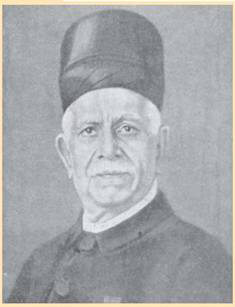
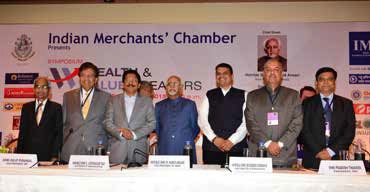
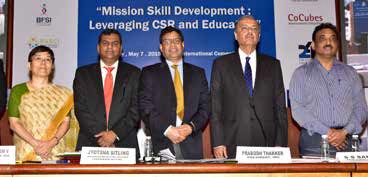
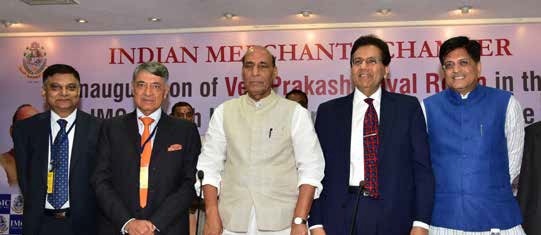
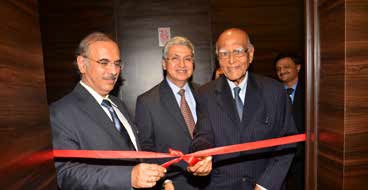
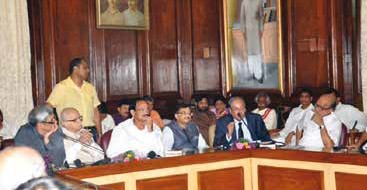
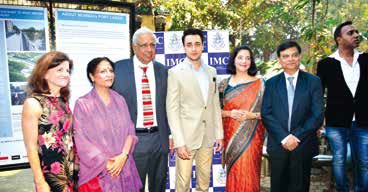
India Calling 2013
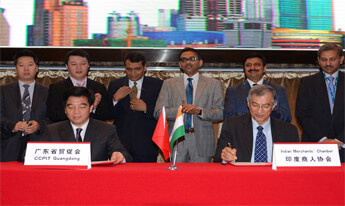
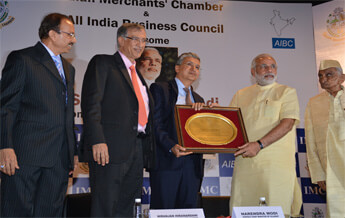
7th International Banking & Finance Conference (Inauguration)
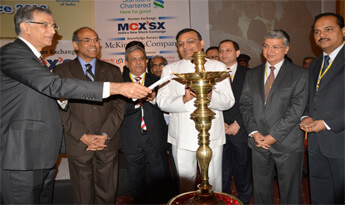
Fusion Conference 2013
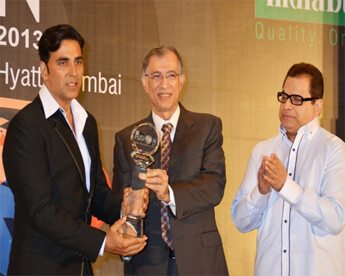
Fusion Conference 2013
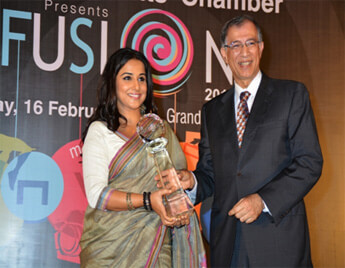
The First IMC-IT Awards 2013
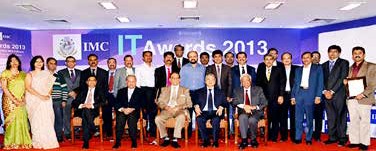
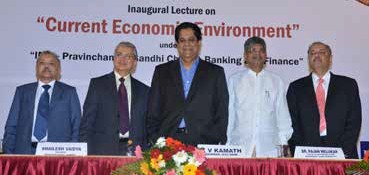
Mrs. Bhavna Doshi, elected as President of the Chamber, the first woman professional, a chartered accountant,and second lady President of IMC and the first woman professional to lead any such Chamber in the country.
India Calling Conference held in Hanoi and Ho Chi Minh City, Vietnam, led by Mrs. Bhavna Doshi, President.
IMC takes a new initiative in organizing Fusion 2012 - Conference on Sports, Media and Entertainment
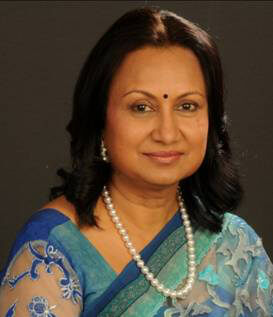
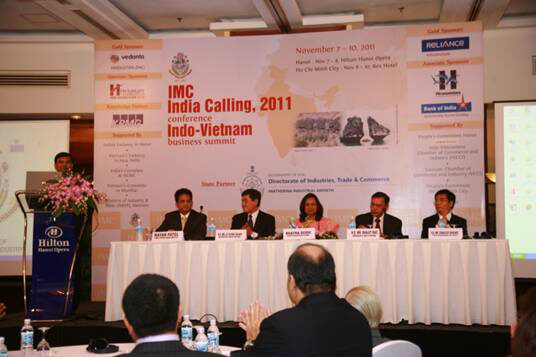
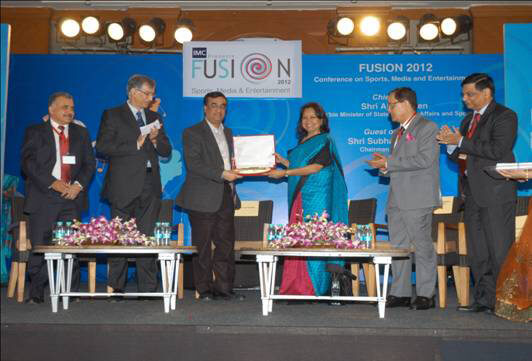
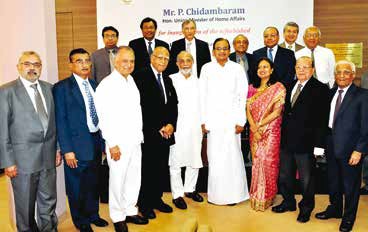
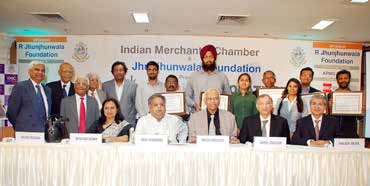
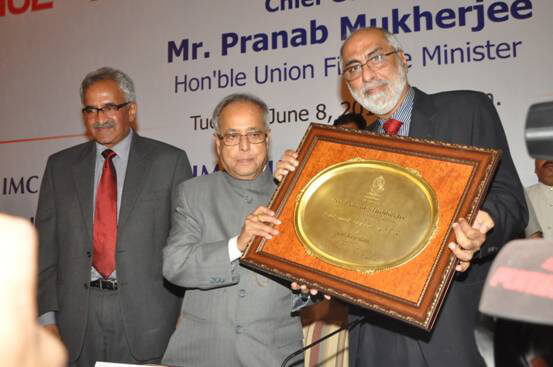
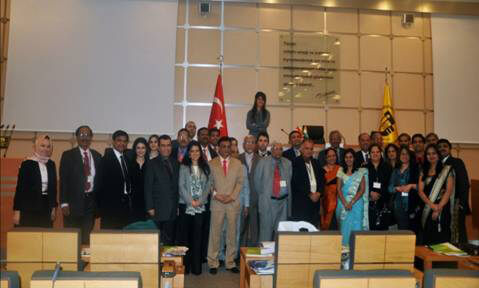
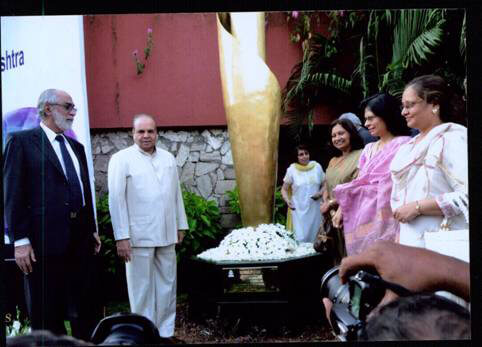
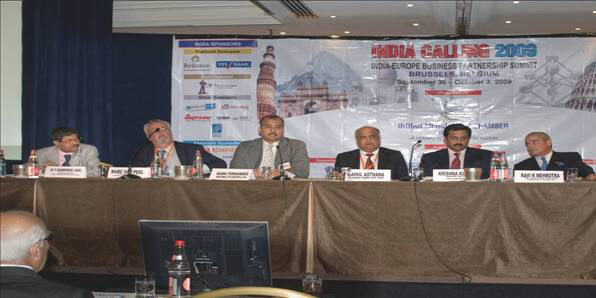
India Calling Conference held in Vancouver and Toronto, Canada, led by Mr. M N Chaini, President.
Vice-President of the United Republic of Tanzania H E Dr. Ali Mohamed Shein visited the Chamber.
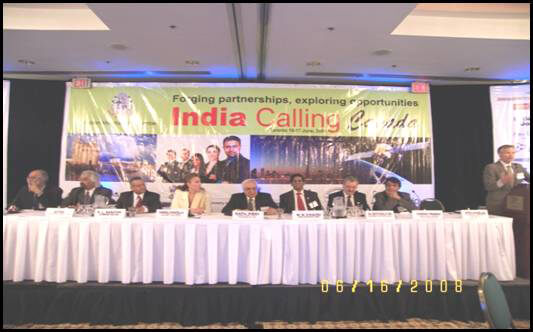
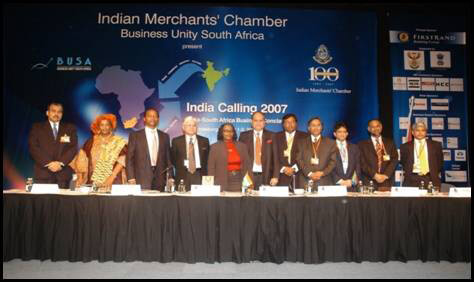
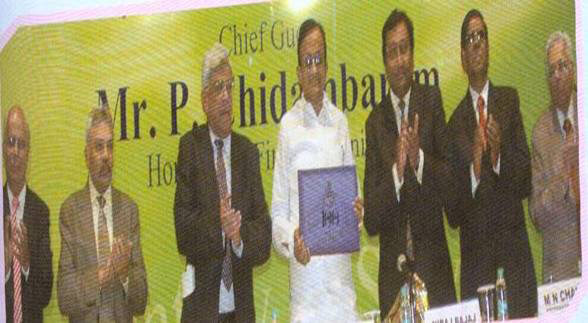
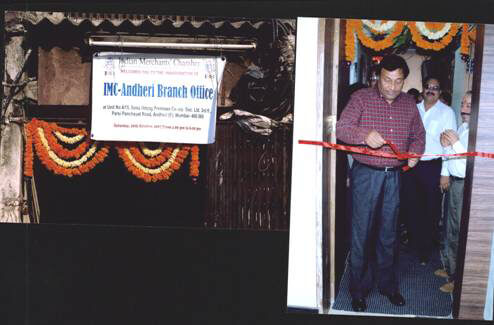
President of India Dr. A P J Abdul Kalam graced the Chamber at the Inaugural Function of the Centenary celebrations.
The Government of India released a commemorative postal stamp, in recognition of its service to the nation, on September 7 at the 100th Foundation-Day Celebrations.
India Calling Conference held in London, UK, led by Mr. Nayan Patel, President.
President of the Republic of Botswana H. E. Mr. Festus Mogae visited IMC.
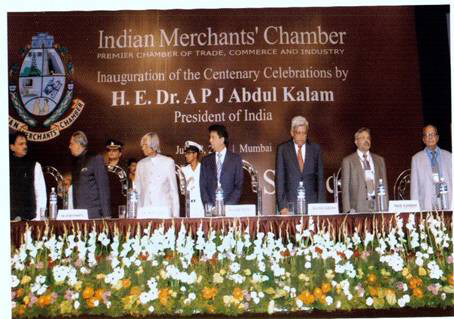
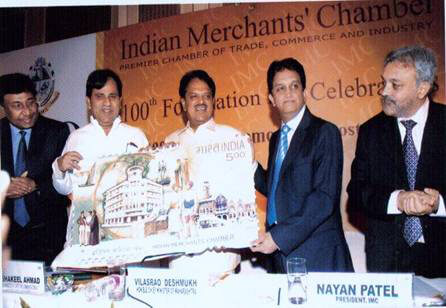
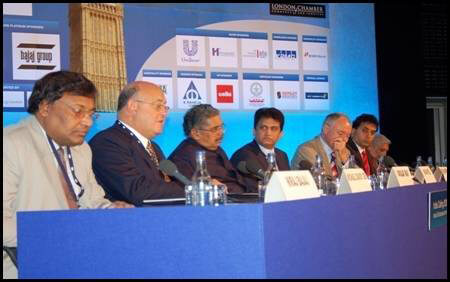
IMC's India Calling Conference held in Dubai, led by Mr. Rajesh Kapadia, President.
Chamber sponsored a high-powered delegation, led by Mr. Rajesh Kapadia, President, to Pakistan.
IMC selected as Tier I Partner for the UNCTAD Project on Textile and Clothing, sub sector Handlooms, after competitive screening.
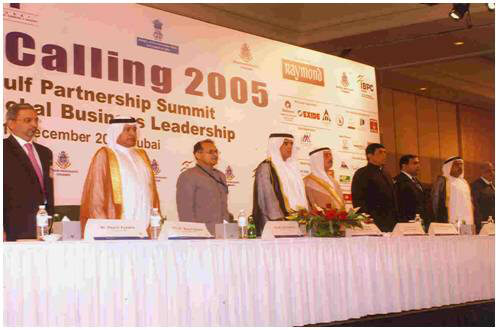
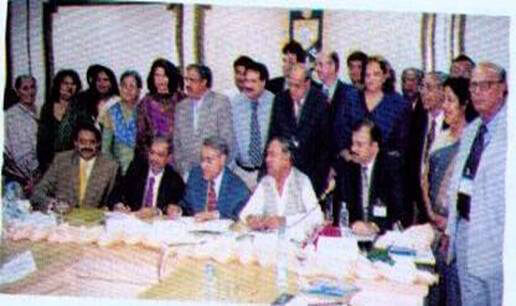
IMC's India Calling Conference held in Singapore, led by Mr. Nanik Rupani, President;the first Conference held overseas in the wake of changing global scenario and increased presence of Indian overseas.
Publication, 'Relevance of Kautilya’s Arthashastra' in today's world released.
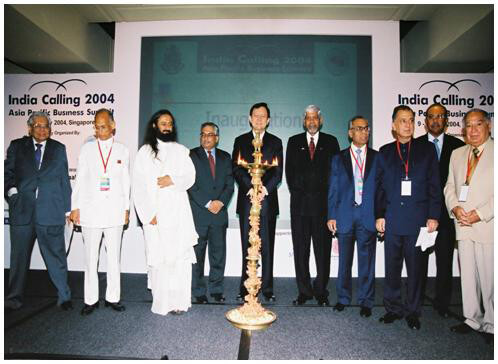
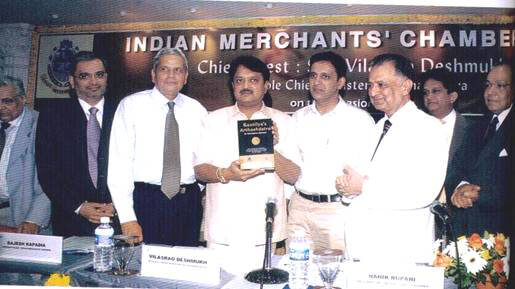
Chamber took initiative to establish the IMC Task Force on Maharashtra Development and initiated a series of panel discussions on 'Mumbai City Development' with various political parties.
Chamber opened its New Delhi office.
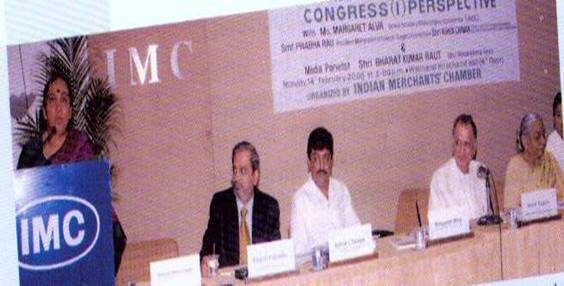
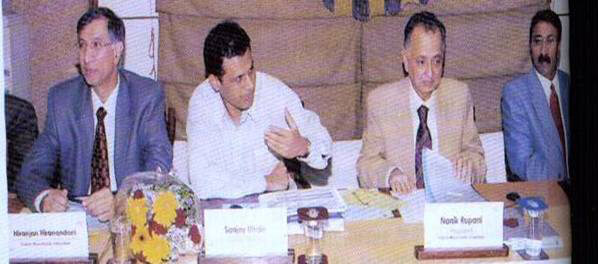
Finance Minister Yashwant Sinha visited the Chamber.
IMC extended its membership to overseas Indians and set up a cell, Overseas Indians Cell.
IMC's First India Calling Conference held in Mumbai, led by Mr. Pradeep B. Chinai, President.
2001 - Chamber hosted Annual Round Table Conference of BPC-Osaka on the theme "Bio-technology", the first-ever BPC Round-table Conference in Mumbai.
The Young Entrepreneurs' Wing, subsequently rechristened as Young Leaders' Forum, launched.
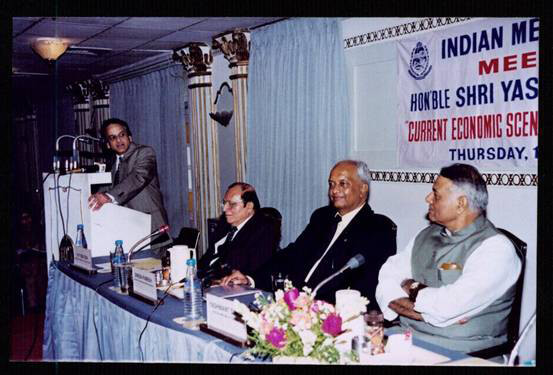
IMC gets ISO 9002-2000 accreditation, the first Chamber to get this certification in the country which has since been upgraded to ISO 9001: 2008.
Anti-Corruption cell set up.
MoU signed with Osaka Chamber of Commerce for BPC Roundtable.
Chamber sponsored a high-powered delegation, led by Mr. Ram Gandhi, President to China.
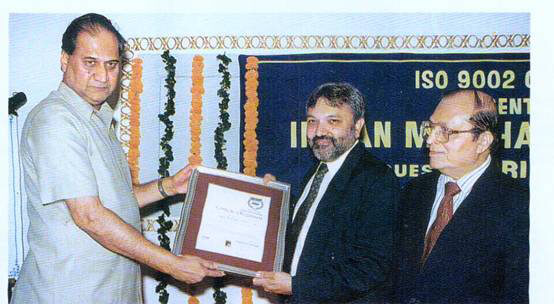
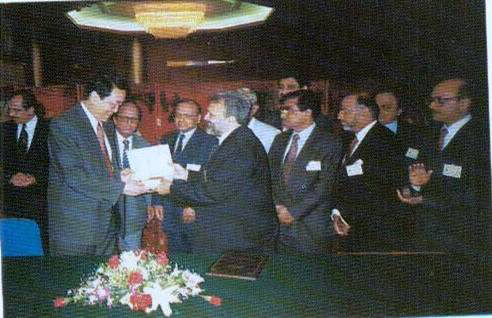
Prime Minister I K Gujral visited the Chamber.
Finance Minister P. Chidambaram visited the Chamber.
Inauguration of IMC Branch office at Navi Mumbai
IMC Ramkrishna Bajaj National Quality (RBNQ) Awards instituted.
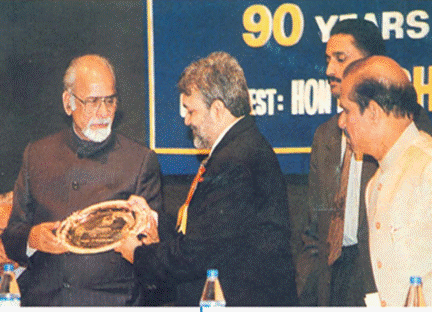
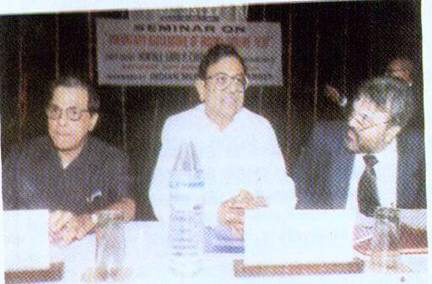
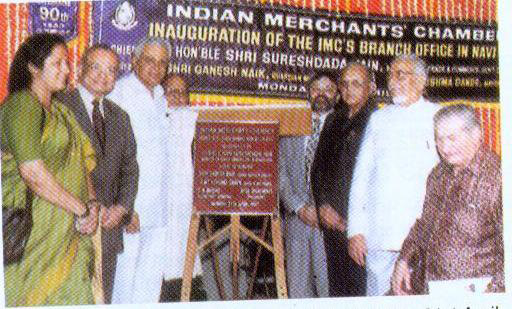
Vice President of India K R Narayanan visited the Chamber and inaugurated the Conference 'Western Regional Cooperation - Infrastructure: Vision 2000.'
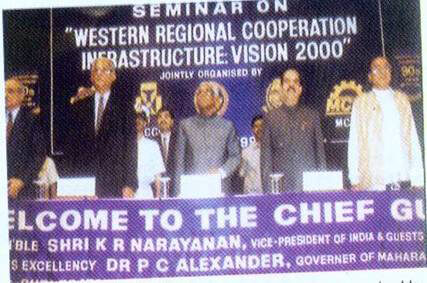
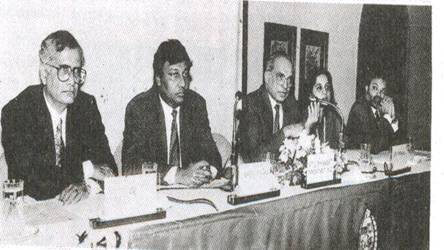
Chamber initiated Western Region Economic Cooperation of states between Maharashtra, Gujarat, Goa, Rajasthan and Madhya Pradesh to facilitate their goal of being economically strong, vibrant and competitive and also to create one common regional market.
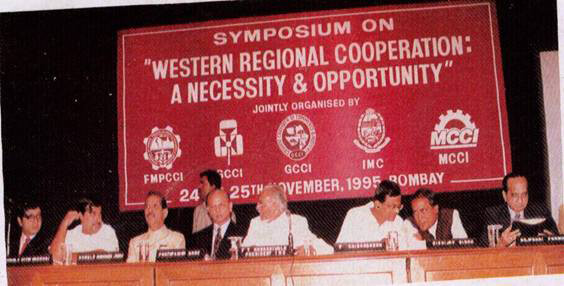
Finance Minister Dr. Manmohan Singh visited the Chamber. Chamber set upQuality Cell with a view to assist businesses in enhancing quality in wake of emerging global competition.
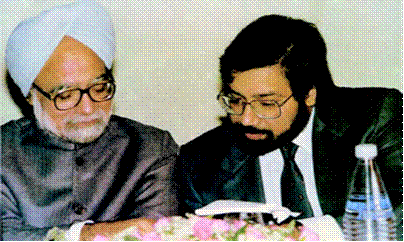
Chamber set up IMC International Business Forum consisting of over 100 prominent industrialists and businessmen to provide specialised services and help expand the global networking of Indian companies.
IMC submitted to the Central Government a 'Blueprint of Economic Reforms', containing a roadmap for various sequential measures to be taken for accelerating growth in the liberalised environment. In the days that followed, most of these suggestions were implemented by the Government.
IMC established its first bilateral Chamber, Indo-Vietnamese Chamber of Commerce and Industry (IVCCI).
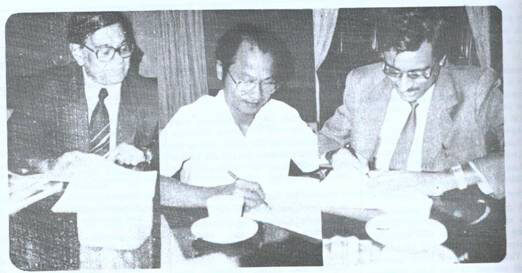
Prime Minister of India Rajiv Gandhi visited the Chamber.
Chamber organized massive rally in Mumbai to press for abolition of Octroi Duty.
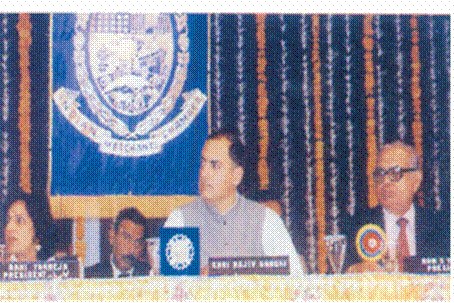
Vice-President of India Dr. Shankar Dayal Sharma visited the Chamber
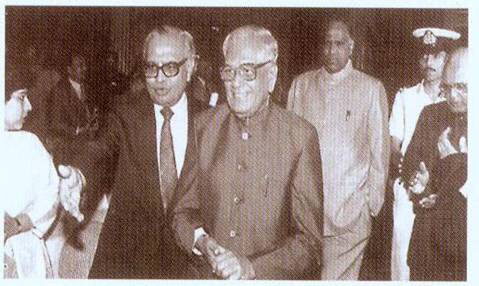
Valedictory Function of the 80th Year celebrations 1988
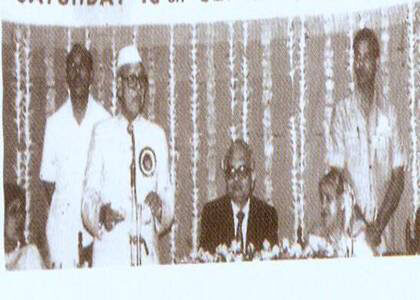
80th Birthday of the Chamber celebrated with Mr. J R D Tata as the Chief Guest.
IMC joined ASSOCHAM as a Promoter Chamber.
IMC took lead to form an Action Committee for abolition of Octroi Duty.
IMC signed first MoU with Polish Chamber of Foreign Trade on February 16.
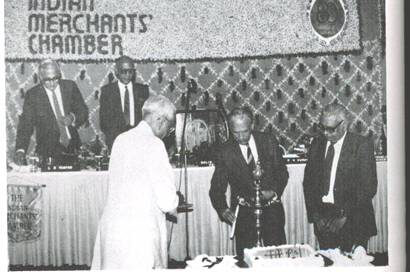
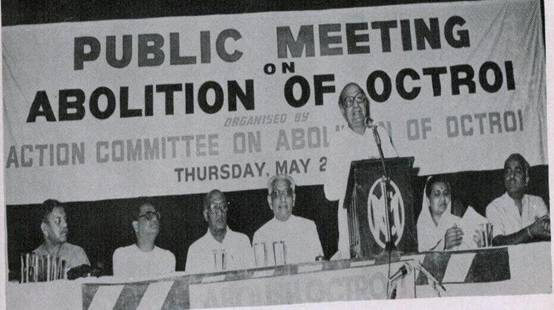
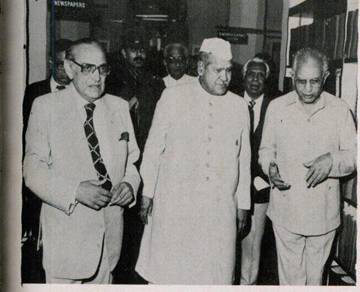
IMC's Court of Arbitration inaugurated by Mr. Justice P N Bhagwati, former Chief Justice of India.
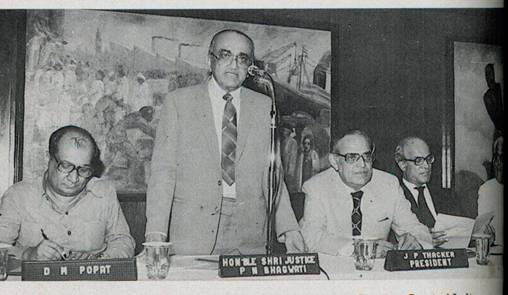
Hon'ble Shri Justice P.N. Bhagwati, Chief Justice, Supreme Court of India inaugurating the IMC Court of Arbitration.
Finance Minister V. P. Singh visited the Chamber
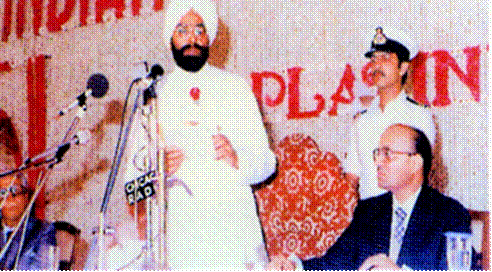
Prime Minister Mrs. Indira Gandhi visited the Chamber
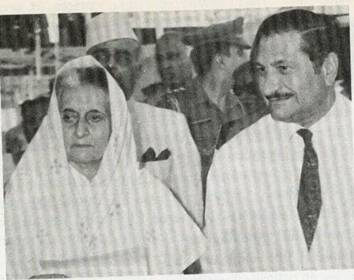
First lady President of IMC - Mrs. Sharayu Daftary - 1981
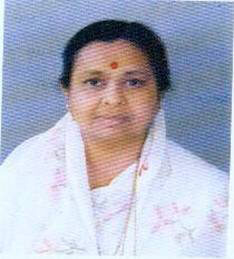
Finance Minister H. M. Patel visited the Chamber
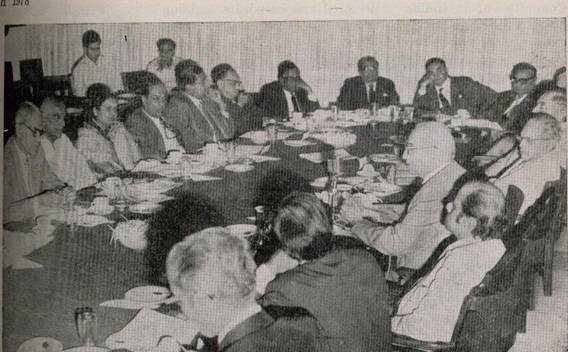
President of India Fakhruddin Ali Ahmed visited the Chamber.
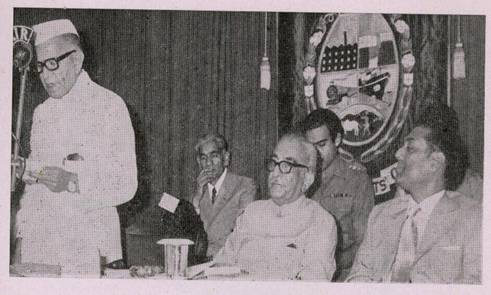
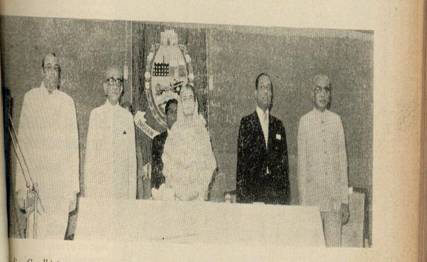
Smt. Indira Gandhi is seen at a meeting organised by the chamber on 28 December, 1974.
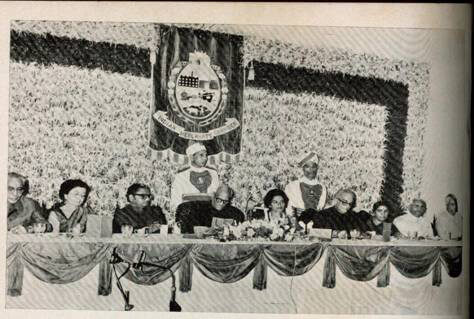
Shri V.V. Giri, President of India, addressing the gathering on the occasion of the banquet on 18-8-1971
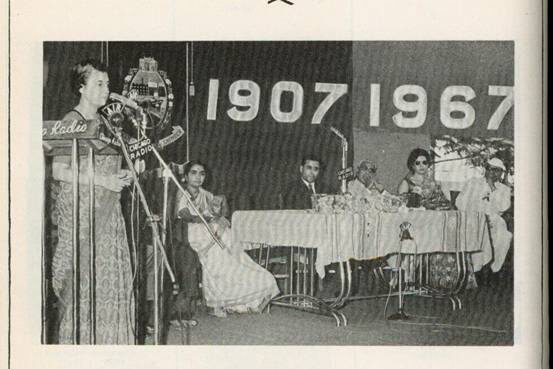
Chamber instituted Endowment Trust Awards, covering important facets of business life and research in science and technology in various industrial fields. Ladies' Wing of the Chamber established with a view to encourage ladies from the families of the members of the Chamber to develop their personality, achieve their true potential and play a meaningful role in the task of nation building.
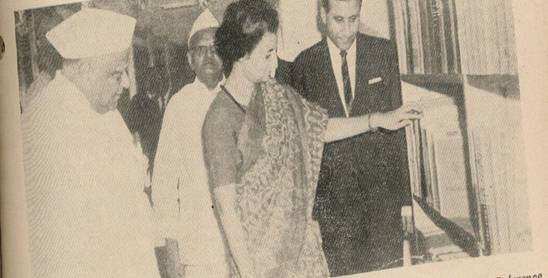
Devaluation of the rupee - Chamber pointed out that it would not benefit Indian exports, as the demand for traditional exports was inelastic and non-traditional exports were facing shortages and higher prices of raw materials and components.
India attacked by Pakistan. IMC takes the initiative to collect sizeable funds for the National Defence Fund as the Chamber's contribution.
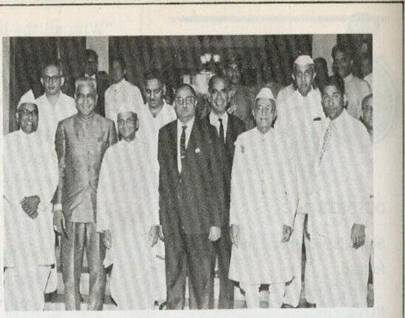
IMC extended full support to the Government in mobilizing resources for defence and in working for containing inflation during the Indo-China war.
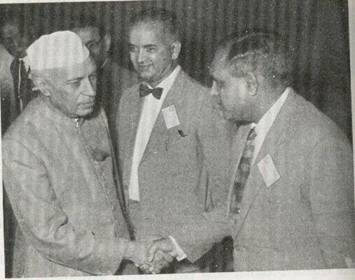
Finance Minister Morarji Desai visited the Chamber.
The Economic Research and Training Foundation (ERTF) set up with a view to promoting research on economic matters of topical interest.
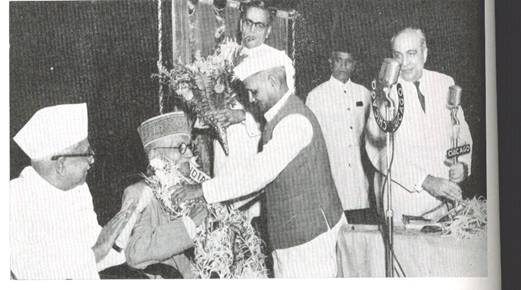
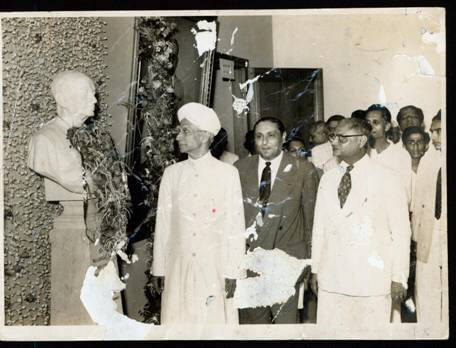
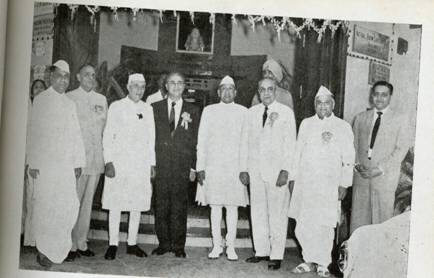
Golden Jubilee celebrations of the Chamber launched by the Prime Minister Pandit Jawaharlal Nehru.
Chamber submitted a Memorandum to the States Reorganisation Commission emphasizing that in the regrouping of provinces, the decisive factor should be administrative convenience rather than linguistic homogeneity
Finance Minister, C. D. Deshmukh, visited the Chamber.
Chamber submitted detailed Memorandum to the Planning Commission conveying its views and suggestions on the main features of the First Five-Year Plan.
Prime Minister Jawaharlal Nehru visited the Chamber
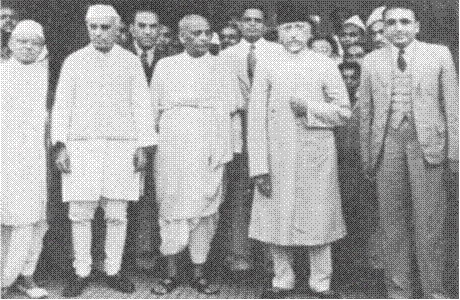
Chamber foresaw independence and established the nucleus of a Research Department. Also strength of the staff was considerably increased to prepare for high level of activities following independence especially, to provide more exhaustive information on trade, commerce and industry to its members.
IMC's representative included on Mumbai Port Trust, which was virtual monopoly of European Commerce, Government officials and Government nominees.
Chamber convened a conference of all its allied business organizations in Mumbai and passed resolutions condemning the government's oppressive measures, which were causing widespread unrest in the country. It called upon the government to release Mahatma Gandhi and to resume negotiations for resolving the political deadlock.
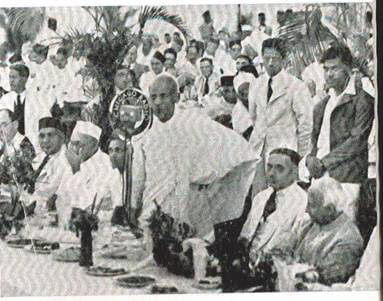
The foundation stone of the Lalji Naranji Memorial Building, which houses the Chamber to date, was laid.The first elected Chief Minister of Bombay, Mr. B. G. Kher, graced the Chamber's 31st AGM as Chief Guest.
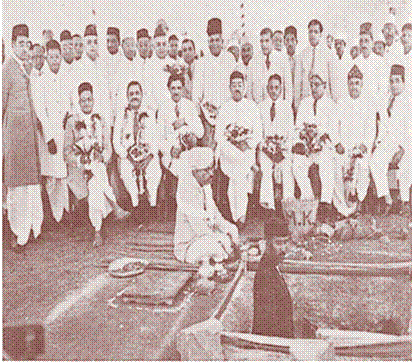
Congress ministries consulted the Chamber on key legislative matters, such as labour relations, industrial research, travel and transport problems and like resulting in a sharp increase in the Chamber's activities.
Chamber retained its seats both in the Central and Provincial Legislatures on promulgation of the Provincial Autonomy Act by Government of India in accordance with the Minto-Morley dispensation.
Chamber decided to send its representatives back to the Legislatures for participating in deliberations on critical commercial and financial measures such as the new Companies Act, the new Insurance Act and the amended Income-tax Act.
The Chamber also lodged its protest against the Ottawa Pact, sharply criticized the unsavory side of aspects of the Indo-Japanese and Indo-British Trade Agreements.
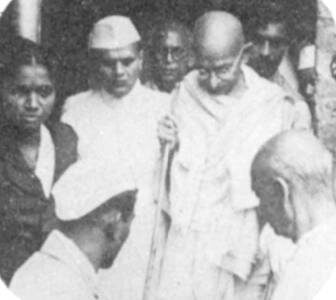
Chamber pulled back its representatives from both the Central and State Legislatures to protest against the internment of Mahatma Gandhi, the imprisonment of Pandit Motilal Nehru and the ill-treatment of political prisoners.
The IMC played key role in establishing the Federation of Indian Chambers of Commerce & Industry (FICCI) which functioned from IMC premises in Mumbai in its formative years (1927-30).
IMC demanded that the Government expeditiously implement the recommendations made by Indian Mercantile Marine Committee for reserving coastal trade to Indian Shipping and for imparting training in marine engineering to Indians.
IMC sets up Commercial Examination Board to impart education in specialized fields, conduct exams and award diploma to successful candidates.
IMC successfully persuaded the Royal Commission to fix exchange rate of the rupee to support Indian industrial and trading houses.
Chamber protested Jallianwala Bagh massacre in strongest terms to the authorities and extended its full moral and material support to the Congress.
Chamber opposed and was successful in getting the GIP Railway's new wharfage rules changed. Even on hardcore political issues such as the Minto-Morley Report on Constitutional Reforms in India, the Chamber was able to make its presence felt and secured for itself representative seats in the Imperial Council in Delhi as well as in the Provincial Legislative Councils in Bombay.
